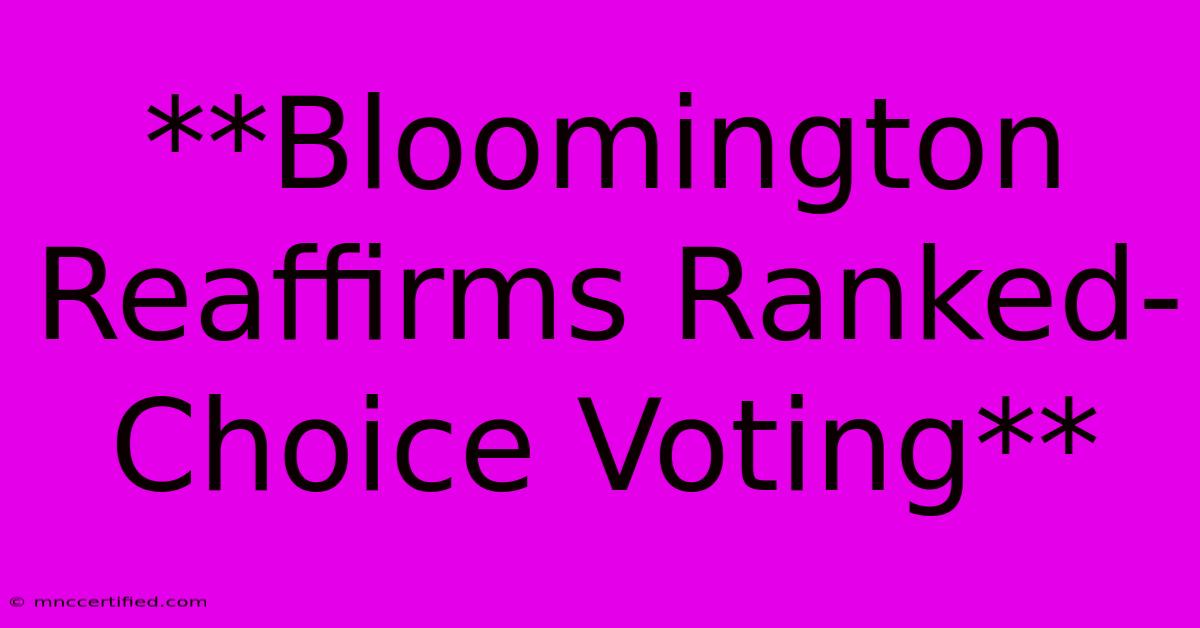**Bloomington Reaffirms Ranked-Choice Voting**

Table of Contents
Bloomington Reaffirms Commitment to Ranked-Choice Voting: A Model for Fairer Elections
Bloomington, Indiana, has once again demonstrated its commitment to fair and inclusive elections by reaffirming its use of Ranked-Choice Voting (RCV). This decision, made by the Bloomington City Council, solidifies the city's position as a leader in electoral reform and continues to attract national attention for its innovative approach to democracy.
What is Ranked-Choice Voting?
Ranked-Choice Voting, also known as Instant Runoff Voting, empowers voters to rank candidates in order of preference. If no candidate secures a majority of first-choice votes, the candidate with the fewest votes is eliminated, and their votes are redistributed according to the voters' second choices. This process continues until one candidate reaches a majority, ensuring the winner has the support of a majority of voters.
Bloomington's Journey with RCV
Bloomington first implemented RCV in 2019 for city council elections, becoming the first city in Indiana to adopt this progressive voting system. The move was met with widespread support from both residents and local politicians, who recognized the potential for RCV to enhance democratic participation and encourage more competitive elections.
The city's initial experience with RCV has been overwhelmingly positive. The system has resulted in more diverse representation on the city council, encouraged candidates to focus on their own merits rather than engaging in negative campaigning, and increased voter engagement.
Reaffirming the Commitment to Fairer Elections
The recent reaffirmation of RCV by the Bloomington City Council reflects a strong belief in the system's ability to create a more inclusive and representative democracy. By rejecting calls to revert to traditional plurality voting, the city council signaled its dedication to fostering an electoral system that prioritizes the will of the majority, rather than relying on a "winner-take-all" approach.
Bloomington's RCV: A Model for Other Cities
Bloomington's successful implementation of RCV serves as a model for other cities looking to improve their electoral systems. The city's commitment to RCV has attracted national attention, showcasing its potential to:
- Increase Voter Participation: RCV encourages greater participation by eliminating the "wasted vote" syndrome associated with traditional plurality voting.
- Promote Respectful Campaigns: Candidates are incentivized to focus on positive messaging and appeal to a broader range of voters, reducing the need for negative campaigning.
- Provide More Representative Outcomes: RCV ensures that the winner reflects the preferences of a majority of voters, even if they don't win a plurality of first-choice votes.
Looking Ahead
Bloomington's continued commitment to RCV sets a strong precedent for other municipalities seeking to modernize their electoral systems. As more cities embrace RCV, the potential for a more inclusive and representative democracy grows. Bloomington's success serves as a powerful example of how innovative voting systems can empower citizens and foster a more engaged and responsive political landscape.
Keywords: Ranked-Choice Voting, RCV, Instant Runoff Voting, Bloomington, Indiana, elections, electoral reform, democracy, voter participation, campaign strategy, representative democracy, inclusive politics, political engagement, voting systems, electoral innovation

Thank you for visiting our website wich cover about **Bloomington Reaffirms Ranked-Choice Voting**. We hope the information provided has been useful to you. Feel free to contact us if you have any questions or need further assistance. See you next time and dont miss to bookmark.
Featured Posts
-
Breakingviews Musks Biggest Conflict Trump
Nov 07, 2024
-
Aviation Professional Liability Insurance
Nov 07, 2024
-
Watch The View Discuss Trump Win On Abc
Nov 07, 2024
-
Trumps Presidential Inauguration Timeline
Nov 07, 2024
-
Lurie Leads Early In San Francisco Mayoral Race
Nov 07, 2024